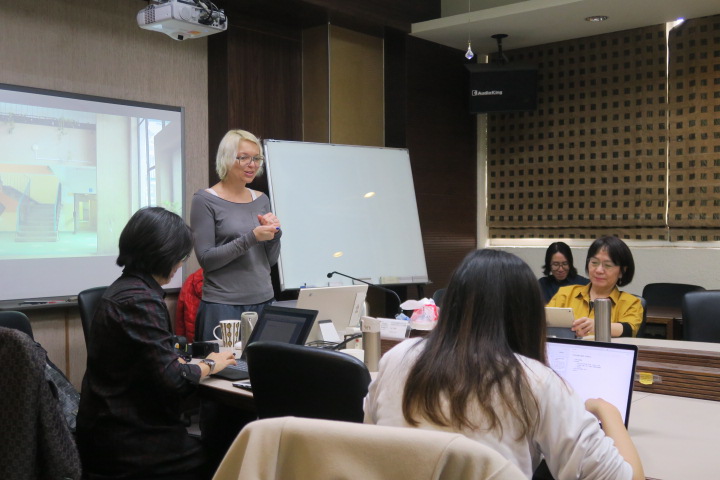

Notes on Cinema and community in the face of political and social instability: Karolina Breguła’s lectures on her artistic practices
2019-04-12
Cinema and community in the face of political and social instability: Karolina Breguła’s lectures on her artistic practices
Writer: Postdoctoral Fellow Desmond Hok-Man SHAM(The International Center for Cultural Studies)
Karolina Breguła is a Polish artist working on various media, and an associate professor at Art Academy in Szczecin. Her works in recent years have been responding to the rise of rightwing politics as well as political and social tensions in Poland and neighbouring Eastern European countries. Breguła creates both scripted pieces and participatory arts. When she is not working on participatory arts, she is usually very careful of, and writes her own texts. She often collaborates with non-professional actors and community members. During her visit at ICCS, she delivered two lectures on her artistic practices, and shared with the audience her video works and cinematic practices carried out both in Europe and in Taiwan.
In 2013, when Breguła was participating in an artist-in-residence program in Budapest, it coincided with the art and museum sector protesting against the far-right ruling party. Breguła felt that she could not simply use the residency program to create apolitical work. She needed to create artworks sensitive to the political tension and anxiety, especially the rise of far-right politics. She wrote the script of the short film The Offense, and invited people working in different levels in art and museum sectors in Hungary to be actors and actresses in the film. Her later film The Soup further questions and reflects upon artists’ engagement in politics. Setting in around a dining table, a group of artists discuss how they can support the “renovation” happening next door (off-scene). Despite not using the word explicitly, the audience understands the artists are discussing whether to support a “revolution” from their dialogue. Unfortunately, the artists’ willingness to engagement diminishes when they recognize the costs.
As the norm of Breguła’s work, she casts non-professional actors and actresses in both The Offense and The Soup. The opera musical film The Tower is an exception, which first appears as stage performance and casts professional opera singers. Shot in a post-war Soviet residential concrete architecture, set in an unknown era and place, the film is about a resident committee discussing the building of a sugar tower, already decided from above, their utopian desire of neighbourhood planning, and the absurd and bizarre situations in reality they encounter. Although Breguła created the work in Poland, and with reference to the aftermaths in the post-Soviet era, the film nevertheless echoes with experiences of overseas audiences. People from other societies also experience the failure of some top-down absurd decisions but they still need to bear the cost (“Don’t forget to pay your rent!” The film remarks).
Besides scripted films, Breguła also co-creates and co-produces artworks with local communities. Community members share the responsibilities and everything from the story, acting, and different positions in the production are done together. She believes in the power of open-air cinema (also known as “mosquito cinema” in Taiwan), especially screening near or just after the sunset when the members of the audience can see both the environment and the projection. People are brought together not necessarily for the film, but for the atmosphere. For this type of works, Breguła believes that quality is secondary; the process that brings people together and makes people remember is much more important. That being said, I do not find the drama episodes that Breguła works with the local communities in Poland, which the artist introduced in the lecture, was a poorly-made piece of work.
Breguła further illustrates how artists working with a community is also able to bring in dialogue with community members. She believes that respect and understanding of differences grow by working together, which ultimately can forestall further division of society and something further extreme. By making small suggestion in the process of working together, and when the artist is gradually accepted in the community, even accepted as a “strange being” opens the possibilities of things being discussed. The story of the abovementioned drama episodes was proposed by a child in the neighbourhood, about a key-eating monster. Throughout many episodes, the residents have heard of the monster and had their keys eaten by the monster, but they have not seen the monster. At some point during the making of the drama episodes, Breguła, who had been very concerned about the rising hatred of refugee and generally differences in the society, found that the unseen monster could be seen as a metaphor of refugee. She then expressed her thought with the community. There were discussion and conversation, and disagreement with respect. Later on, the community decided that there would be an episode dedicated to the background of the monster, and let the monster talk about his story: why he has arrived at the neighbourhood, why he begins to eat the key, and about his dream.
In the lectures, Breguła presented how her artistic practices in different styles and with various ways to collaborate with different communities respond and engage with the political and social anxiety and instability. Yet, artists cannot escape from the question of how the works are commissioned, and the subtle and not-so-subtle relationship with art institutions. Whether engaging merely with the soup, or taking the opportunity to open a dialogue about the monster will continue to the constant questions, not only concerning artists but also intellectuals alike.

近期新聞 Recent News


